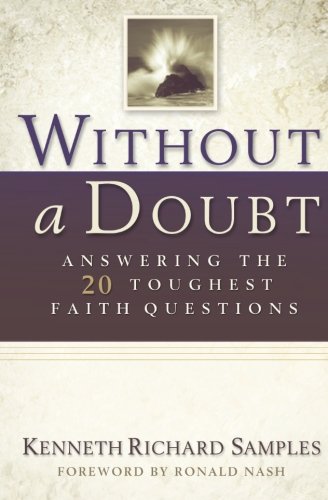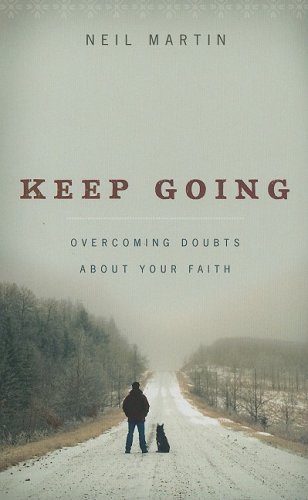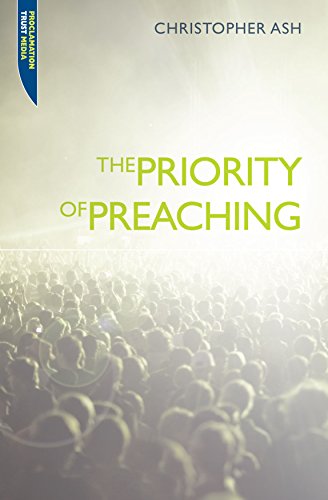Without a Doubt: Answering the 20 Toughest Faith Questions (Reasons to Believe)

Buy online ($)
Type
Book
Authors
ISBN 10
0801064694
ISBN 13
9780801064692
Category
Doctrine - Apologetics
[ Browse Items ]
Publication Year
2004
Publisher
Pages
287
Description
"I still have wonderfull memories of professor Samples' classes at Cerritos College. One of which is the first day of his World Religions class. As with C.S. Lewis, students filled the entire room and lined the walls just to hear him deliver his lecture. Samples has wonderful way of delivering his material and certainly stands in the tradition of C.S. Lewis, Calvin, Luther and, of course, St. Augustine.
... demonstrates years of solid reflection on some of the toughest questions about historic Christianity. A few of the questions addressed are: 'How can anyone know that God exists?' 'Aren't the creeds a thing of the past?' 'Are the Gospels trustworthy accounts of Jesus' life?' along with questions regarding the nature of the trinity, religious pluralism, and Christianity and science.
Since each chapter addresses a question the text can work as a kind of catechism. In essence, this is a work that helps the lay person understand the central doctrines of the Christian faith.
One of the nicest surprises about Samples' book is his defense of creedal Christianity. The ecumenical creeds (Apostles', Nicene, Athanasian, and Chalcedon) are often overlooked in works of apologetics. Nonetheless, the creeds have always defined authentic Christianity against heresies, sects, theological renegades, and schismatics. In the sense that the creeds serve to defend and present correct Christian teaching, they are apologetic in nature. Professor Samples thoughtfully addresses concerns that some from non-confessional or non-creedal churches may have:
Some Christians oppose the use of creeds altogether. The expressions 'No creed but Christ' and 'No book but the Bible' emerged among certain American Christian groups in the nineteenth and early twentieth centuries. Their concern was that creeds may somehow eclipse the biblical revelation of Christ. However, four brief points should be considered. First, the assertion that a person has no creed but Christ is itself a 'creed,' a personal creed. Creedal statements are hard to avoid. Second, creeds appear in Scripture and were used by the apostles. Third, creeds serve a very important function in identifying and clarifying beliefs. Fourth, having no formal and written statement of one's beliefs can be problematic. Groups can conveniently conceal deviant doctrinal views, and those unwritten beliefs can be open to unhealthy subjective interpretations of Scripture.
Nevertheless, it is a helpful reminder to know the role and purpose the creeds play when presenting and defending historic Christianity. We are further reminded that though the creeds themselves will not save anybody from eternal destruction, the Christ presented in the historic creeds does save. It is the Christ of the creeds that saves. The creeds present the significance of Christ and Christian truth in a powerful and succinct way.
Professor Samples presents a sound understanding of the historic nature of Christianity. When reading ... one is reminded of the words of the historian U.B. Phillips 'We do not live in the past, but the past in us.' We learn from Samples how the creeds and important Christian teachers of the past shape our current understanding of doctrine and theology. Professor Samples draws insights from such historic figures as Clement of Alexandria, Irenaeus, Augustine, and C. S. Lewis. He critiques the ideas of David Hume, Karl Barth, and Bertrand Russell from the vantage point of classical Christian teaching.
Samples is also fluent in the current research in apologetics and often draws from significant thinkers such as Alvin Plantinga, Alister McGrath, and John Warwick Montgomery to name a few.
Without a Doubt opens with questions about faith in God, and how one can reasonably believe in a theistic universe. Samples addresses the anthropic principal (the unique character of the earth to support life) and the Kalam cosmological argument (the universe has a cause for its coming into being). Samples explains that only God can account 'for the order, complexity, and design evident in the universe'.
After presenting the case for a divine Creator of the universe (the God of the Bible), the second part of the book focuses directly on questions regarding the person and work or Christ.
Interestingly, Without a Doubt parallels what Paul accomplishes at the Areopagus in Acts chapter 17. There, Paul addressed the Athenians and presents to them the "God who made the world and everything in it" (17:24). Then the apostle explains that they must place their faith in Christ or face judgment (17:31).
Although no apologetic method is given in scripture - we see an evidential and empirical emphasis on the use of the senses in Luke 24:39 - 40, Matthew 28:6, and I John 1:1-2. The use of the mind and rationality is affirmed in 1 Corinthians 10:15, 2 Corinthians 10:5 and 1 John 4:1.
And Romans 1:18 -23 teaches that the truth of God is clearly perceived by unbelievers. What we can learn from Paul on Mars Hill, is that whatever apologetic method one uses to establish the reasonableness of a divine Creator, the apologist should move to Law and Gospel as soon as possible (as Paul does in Acts 17:30 - 31).
Samples draws his arguments from a variety of philosophical and historical sources and admits to being somewhat eclectic in his methodology. This should not be a concern, however. The thoughtful apologist should be able to draw upon many valid arguments for the truth of Christianity and to seek "many proofs" taught in Acts 1:3.
Without a Doubt needs to be read thoughtfully and carefully. The truth presented in its pages is written for anyone wanting to know more about historic Christianity. Although written for the layman, Samples does not shy away from using technical language, but definitions are always given and it shouldn't be too hard for anyone to follow the text. Without a Doubt demonstrates that Christianity alone makes more sense out of reality than any other religion and provides real answers for anyone with genuine questions." Amazon review
"Without a Doubt provides answers to tough questions about Christianity that assure the heart and satisfy the mind of Christian, seeker, and skeptic alike."
Number of Copies
1
| Library | Accession No | Call No | Copy No | Edition | Location | Availability |
|---|---|---|---|---|---|---|
| Main | 90 | 1 | Yes |




